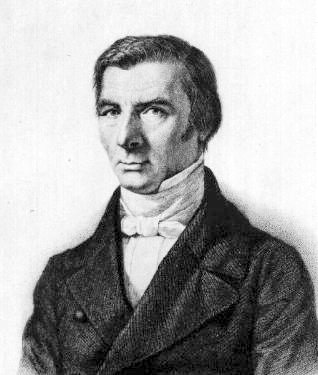

Friend Felix Coudroy
Queer Places:
Domaine de Sengresse, 544 Route de Goûts, 40250 Souprosse, France
Church of St. Louis of the French, Piazza di S. Luigi de' Francesi, 00186 Roma RM
 Claude-Frédéric
Bastiat (29 June 1801 – 24 December 1850) was a French economist and writer
who was a prominent member of the French Liberal School.[1]
Claude-Frédéric
Bastiat (29 June 1801 – 24 December 1850) was a French economist and writer
who was a prominent member of the French Liberal School.[1]
Bastiat developed the economic concept of opportunity cost and introduced the parable of the broken window. He was also a Freemason and member of the French National Assembly.[2]
As an advocate of classical economics and the economics of Adam Smith, his views favored a free market and influenced the Austrian School.[3]
Bastiat was born on 29 June 1801 in Bayonne, Aquitaine, a port town in the south of France on the Bay of Biscay. His father, Pierre Bastiat, was a prominent businessman in the town. His mother died in 1808 when Frédéric was seven years old.[4] His father moved inland to the town of Mugron, with Frédéric following soon afterward. The Bastiat estate in Mugron had been acquired during the French Revolution and had previously belonged to the Marquis of Poyanne. Pierre Bastiat died in 1810, leaving Frédéric an orphan. He was fostered by his paternal grandfather and his maiden aunt, Justine Bastiat.[4] He attended a school in Bayonne, but his aunt thought poorly of it and so enrolled him in the school Saint-Sever. At age 17, he left school at Sorèze to work for his uncle in his family's export business. It was the same firm where his father had been a partner.
Bastiat began to develop an intellectual interest as he no longer wished to work with his uncle and desired to go to Paris for formal studies. This hope never came true as his grandfather was in poor health and wished to go to the Mugron estate. Bastiat accompanied him and cared for him. The next year when Bastiat was 24, his grandfather died, leaving him the family estate, thereby providing him with the means to further his theoretical inquiries.[4] Bastiat developed intellectual interests in several areas including philosophy, history, politics, religion, travel, poetry, political economy and biography.
After the middle-class Revolution of 1830, Bastiat became politically active and was elected justice of the peace of Mugron in 1831 and to the Council General (county-level assembly) of Landes in 1832.
Bastiat was elected to the national legislative assembly soon after the French Revolution of 1848.[3]
Bastiat's closest friend was M. Felix Coudroy, a graduate of the law school of Toulouse.. Bastiat married, but in a very odd way. The woman was wealthy and he needed the funds at the time for the family property. They married and then basically never saw one another after that, she pretty much disappears from his life. They never live together as man and wife. It was a property arrangement, as was often the case for the more wealthy individuals of the time. When Bastiat was at home in Mugron he spent every day with Coudroy, and when he was away he wrote Coudroy regularly. His entire adult life revolved around Coudroy (in person when possible, by letter when not). There is little to nothing written about Bastiat and Coudroy and their possible relationship. The relationship with Coudroy is, at the very least, very suggestive of a romantic involvement, and there is no evidence of any other romance in Bastiat's life.
His public career as an economist began only in 1844, when his first article was published in the Journal des économistes during October of that year and it was ended by his untimely death in 1850. Bastiat contracted tuberculosis, probably during his tours throughout France to promote his ideas and that illness eventually prevented him from making further speeches (particularly at the legislative assembly to which he was elected in 1848 and 1849) and ended his life. During the autumn of 1850, he was sent to Italy by his doctors and he first traveled to Pisa, then to Rome.
On 24 December 1850, Bastiat called those with him to approach his bed and he murmured twice the words "the truth" before he died.[4]
Bastiat died in Rome and is buried at San Luigi dei Francesi in the center of that city. He declared on his deathbed that his friend Gustave de Molinari (publisher of Bastiat's 1850 book The Law) was his spiritual heir.
My published books: